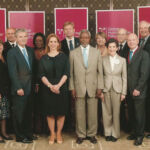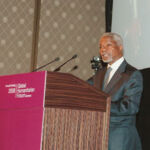The Founding Board of the Global Humanitarian Forum.
Following the invitation of the Founder and Chairman of the Global Humanitarian Forum, H.E. Mr. Kofi Annan, 360 leading personalities from all over the world, as well as experts and representatives of governmental and non governmental organisations, were assembled in Geneva in June 2008, in order to join their forces and seek solutions to the problems caused to humanity by the climate change.
The President of the “Foundation for the Child and the Family”, and Foundimg member of the Global Humanitarian Forum, Mrs. Marianna V. Vardinoyannis, was also present.
At the beginning of the first Annual International Meeting, organised by the Global Humanitarian Forum, H.E. Mr Kofi Annan said inter alia: “Hurricanes and floods, heat waves and frost, that are getting more and more frequent and often affect more and more parts of the Earth, leaving behind dead, missing and homeless people, creating enormous immigration waves and condemning millions of people to live below the limits of poverty, constitute the human face of climate change”. He then concluded: “The challenge of the 21st century is that the global community is called to come up with direct and effective solutions regarding the impacts of the climate change on the poor and vulnerable groups of people”. This is precisely the challenge to which those participated in the Meeting were called to respond.”Our intention”, Mr Annan pointed out, “is to bring together on the same picture, many different protagonists who do not usually work together, so that joined together they could tackle the challenges of humanity and restore “climate justice” more effectively: For that polluters must pay, the ones that caused the problem the environmental pollution; not the poor and vulnerable countries and populations. The wealthy countries have the luxury of time; they can face climate change as an imminent danger and negotiate on the reduction of carbon dioxide emission. Meanwhile, poor countries suffer because of the wealthy ones, so it is urgent that we seek practical solutions that will strengthen the vulnerable communities and protect them from the already present consequences that the changes have caused. It is urgent that we are all bound together against this common threat, and be strengthened in a frame of solidarity, so to begin the construction of a better world. We owe this to the people that suffer; we owe this to our children”.
During the Meeting, the experts presented the results of the most recent researches regarding the climate change, the size of the impact today and their forecasts for the following years, creating, thus, a platform of knowledge on which the strategy of Global Humanitarian Forum will be based in the very near future.
It was pointed out that:
The more the climate change is intensified the more the danger of the destruction of humanity grows.
A failure to come up with effective solutions which will terminate the progress of climate change is equivalent to failure of development, failure of the efforts for poverty reduction.
There in no country in the world that will remain unaffected from the devastating impacts of the temperature increase of the planet, no matter how wealthy it is.
The climate change destroys every opportunity for development and progress and extends the inequality gap between the poor and rich populations.
We are already at the critical point beyond which the ecological destruction is inevitable and irreversible.
However, a small opened window to prevent the total destruction still exists, but in very short time this window will close for ever. Humanity has a maximum of a decade to change course and be saved.
Nowadays we have the knowledge, the means and the resources to act dynamically. We lack the alertness, collective interest and human solidarity.
Our world may be separated in continents, states and small countries, but all these are definitely interacting ecologically. We all share the same planet. This means that each one of us is separately accountable for the ecological destruction, but also has the ability to save the planet.
The leaders and the citizens of rich countries should, more that anyone, realise their historical responsibility for this problem and undertake immediate initiatives to drastically decrease carbon dioxide emission and forests destruction.
The salvation of the planet requires collective as well as individual action, vigilance, collective vision, and collective respect to human rights as well as to the rights of the next generations.
During the two days of the Meeting in Geneva, major topics related to climate change were discussed in separate panels, such as “Climate justice and globalisation”, “Technology and climate change”, “The role of mass media and the responsibility for the climate”, “Health and climate change”, etc. Solutions and actions for the reinforcement of the populations vulnerable to the changes of climate were also proposed.
The testimonies and calls of five young people from Brazil, India, Canada, Togo and Marshall Islands were particularly touching as they described in a shocking way the problems, losses and agony of their people, who already experience the consequences of climate change.
Among the speakers there were: the President of Maldives, Mr. Maumoon Abdul Gayoom; the Minister of Foreign Affairs of France, Mr. Bernard Kouchner; the Minister for International Development Cooperation of Sweden, Mrs. Gunilla Carlsson; the Minister for Development, Cooperation and Humanitarian Affairs of Luxembourg, Mr. Jean-Louis Schiltz; the Chairman of the Virgin Group, Mr. Richard Branson; the United Nations High Commissioner for Refugees, Mr. Antonio Guterres; the President of the International Committee of the Red Cross, Mr. Jakob Kellenberger; the Secretary-General of the World Meteorological Organisation, Mr. Michel Jarraud; the Director-General of the World Trade Organization, Mr. Pascal Lamy; Prof Jeffrey Sachs, Director of the Earth Institute at Columbia University and special advisor to United Nations Secretary-General; Chairman of the Board of Directors and Chief Executive Officer of The Coca-Cola Company, Mr. E. Neville Isdell; the President and CEO of Sony Ericsson, Mr. Carl-Henric Svanberg and many others.




